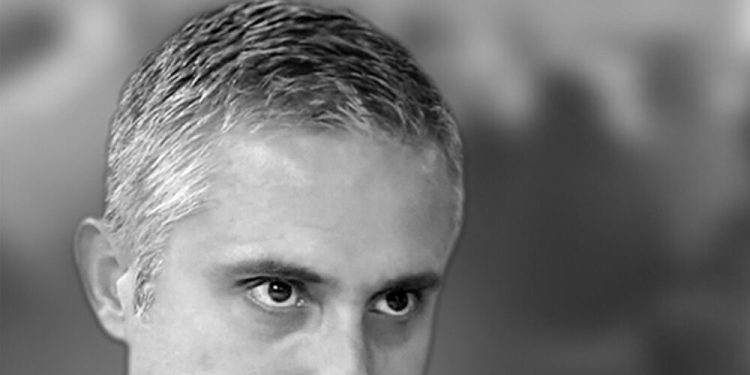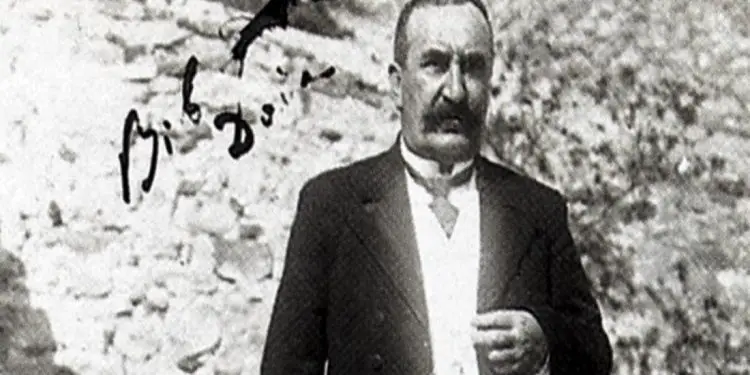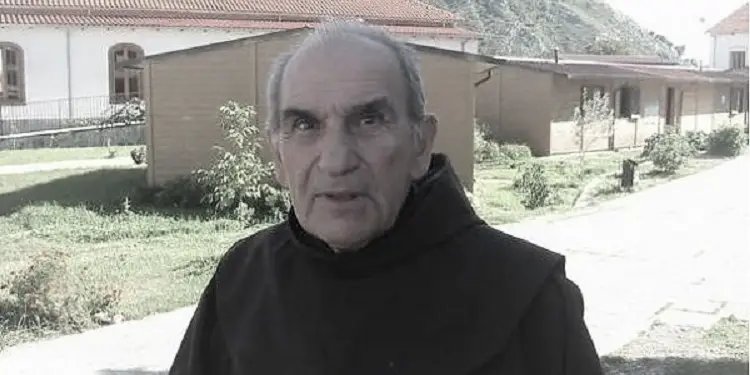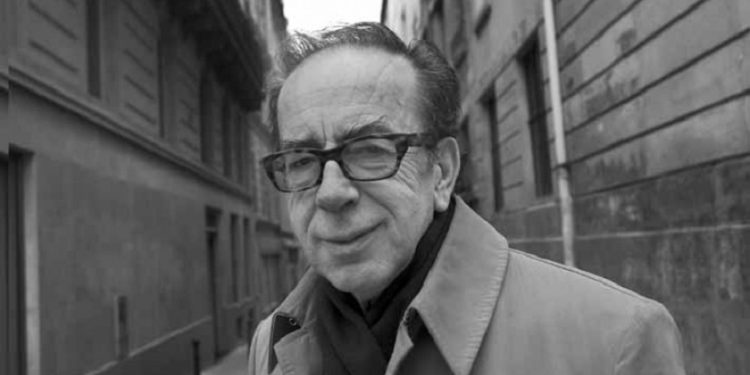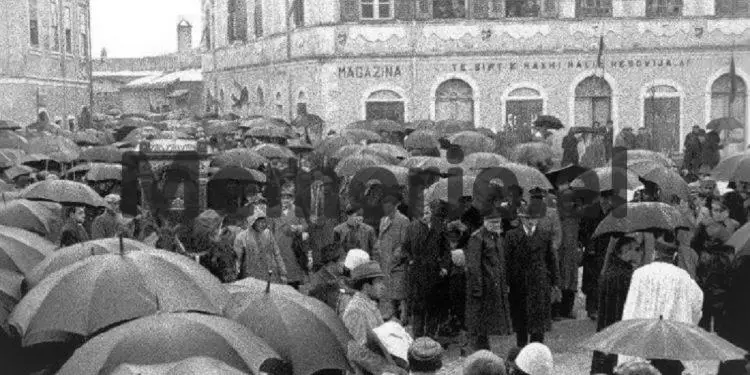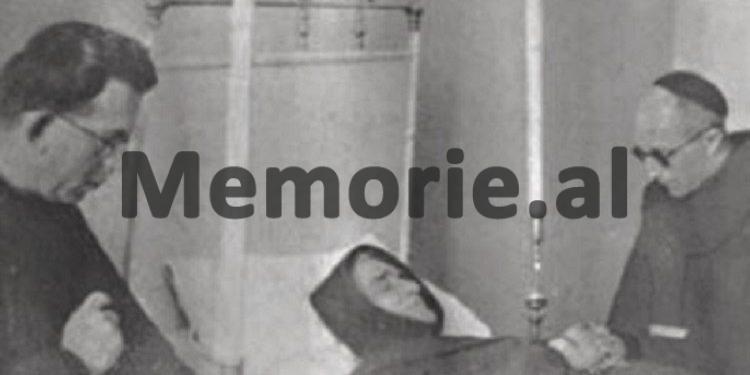By Irhan Jubica
Second part
Memorie.al / Question marks, too many question marks? Are the remains of Gjergj Fishta really thrown in Drin? Isn’t this story more of a legend, that because of the sensitivity of the public, turned out to be more functional than the literary one of 1963, with a general and a priest as protagonists? Is it possible that the same witness was present even when the grave was violated, which, according to a gravedigger, was about two meters away from the inscribed plaque, even when the bones were put in the bag, even when they were loaded into the cart and when the carriage has traveled along the city through a road of about 3 km. until Drin?! The Drin covers a good part of Shkodra, so where did they go to the Drin? On what date? At what time? Who else was a witness? Who were the gravediggers? What about the coachman? Did the gravediggers know what they were digging for? And the coachman, did he know what he was throwing into the river? Who ordered all these people? What if Fishta’s bones were not thrown into the river at all, but were hidden somewhere else?!
Continues from the previous issue
It is clear that as far as the period from 1945 onwards, most of the names accused by Father Konrrad Gjolaj, have continued to lead the war against religion until the end, that is, the closing of churches and mosques. Unlike the anonymous one from December 1990, cited by Zef Pllumi, Konrrad Gjolaj does not mention the name of Bilal Parruca, an active figure in the party, social and even journalistic life in Shkodra of those years, but the addition of this name does not exclude the possibility that the violators of Fishta’s grave are some of the aforementioned names.
Even the confirmation or rejection of this hypothesis based on fact, on a stable basis, also belongs to the future, since the witnesses have decided to keep their mouths shut. For a long time, not only in the “oral newspaper of Shkodra”, there is a version circulating according to which two men of the same family, with the same surname, carried out the exhumation and throwing of the bones in Drin. But these two men bear the last name of one of the members of the Assembly of Albania.
Political power, not only in Albania, has drowned truths and great people, to the question that; are the names of the accused from this “newspaper”, in the list above, or are those names kept, not only for politics, but perhaps also for reasons of the reputation of the faith, more accurately than anyone else, the witness can answer only the public of the exhumation, F. Topalli, who speaks through someone else’s writing, but without ever showing, what was his so powerful status, which enabled his presence from the moment the grave was violated, until in the dumping somewhere in Drin, of the remains of Gjergj Fishta, perhaps on one of the first days of distant April, 1967?!
In this city, a former worker demands a large reward to show the place where, according to him, Fishta’s remains are hidden, which he claims were not thrown into Drin. How right this man is in his claim, probably will never be learned, not only that for 16 years, he has not found anyone to buy his truth, but also that this variant is put on the market, a long time ago, by people with dubious credibility and with unclear goals.
Kadare, visits Fishta’s grave
On one of the first days of April of our year 2007, Ismail Kadare, privately visited the Franciscan Church in Shkodër. Perhaps it is a coincidence that this visit takes place on the 40th anniversary of the ban on religion, a time that also marks the violation of Gjergj Fishta’s grave, but Kadare may have wanted to commemorate that very event, with his new friend, Zef Pllumi . The director of the wonderful Franciscan Library, deacon Viktor Demaj, does not deny the arrival of Kadare to the Franciscans, but takes care to distance the church, calling it simply, as; “a private visit, for Ate Zef Plumi”.
Frat Viktori, who expects to be ordained a priest this year, does not want to reveal any details of the visit, even though it is known that in addition to walking around the premises of the former cinema “Pünetori”, Kadare had, during his one-day stay, also a lunch considered “work “, with some close collaborators of the Franciscan clergy in Shkodër, and some other guests. There are rumors that starting from the writer Kadare’s new love for Catholicism, they talk about the possibility of converting to Christianity, just as it is said that another Albanian leader may have converted years ago.
Supporters of this thesis present this possible action of the writer as a sacrifice that Kadare is ready to make, to prove to the world the western orientation and identity of the nation he represents. For unknown reasons, the visit was kept secret, away from the media and the public, but it is known that the guardians of this visit have damaged the positive character of Kadare’s pilgrimage to the Church of Fishta, with very diligent interventions to maintain secrecy. However, a lot has been said about this visit in the public opinion.
Who built Fishta’s grave?
On the memorial plaque, to the left of the Franciscan Church, another date of the reburial of Fishta’s remains is written, from what the few chronicles of the time, quoted above, write.
However, the very strange fact is that since November 4, 1990, when the resurrection mass was held in Rrmaj, or since the evening of December 90, when “anonymity” confirmed the violation of the grave, or since 1991, when it was created association named after the poet, or since 1993, when the Franciscan Church was being reconstructed and, until November 13, 1995, “after two years of work, when it was time to lay the floor of the church with marble slabs”, no attempt was made , for finding the remains of Gjergj Fishta?!
It’s been five long years, since the confessions of some Franciscans who have written passionately about Fishta, have been filled with newspaper articles. Zef Pllumi says that; the “demek-democratic” Albanian state turned a deaf ear to his request for help in finding the grave, which he himself writes that he opened for Fishta, on the icy night of December 31, 1940.
But Pllumi, who claims that he learned the news about the violation of Fishta’s grave from an “anonymous” only in 1990, does not say what the “hyenas” were, that could be around Fishta’s grave even after 1993. when in the Church, whose keys Cavallini had, work was being done on the restoration even by the witness of 1967, even supervised by another Topall, the husband Tonç, of the future democratic speaker.
Although notarized, the record of the discovery of the bones seems to conflict with the truth, at least as far as the date is concerned. Excavations have started on dt. November 13, and in the “Great Franciscans”, it is written that; “Tomorrow the excavations continued again. A piece of the religious garment (stola) was found…, while the record dated November 13, 1995, includes in the list of objects found, the stool, along with other bones, phalanges, carpals and metacarpals, possibly of the hand to the left of Fishta, considering the burial site.
Pllumi writes that; the sculptor of Fishta’s only monument, Pjerin Kolnikaj, is also the author of the tomb project, realized with marble materials, with bronze letters. Without undergoing any scientific analysis, the bones found 2 m. underground, together with the protagonists who were grouped in a special commission, waited until 1996. to honor the memory of the poet, whose grave has cost the state 1350 dollars.
Looking for one; “Why”?
In vain, Ernest Koliqi, one year before the violation of Fishta’s grave, writes from Italy: “Whoever condemns Fishta, wants to destroy the spirit of the connection of Prizren, denies the essential idea of the Albanian renaissance. Who wants to bury the work in the abyss of oblivion, forget the historical and geographical factors, which make up the reason for being an Albanian Albania”.
Later, Zef Valentini would not be satisfied with the surprise of the continuation of the attacks, but would “almost officially” ask the Albanian state to reevaluate Fishta, becoming one of the first to understand the reasons for the poet’s punishment: “How can maybe… that the regime of Hoxha and Shehu have punished him with the most outrageous ostracism?
They are not at all knowledgeable people, nor excellent thinkers, but only equipped with a sense of smell and cunning, qualities that are common in Albania. The truth is that the first evidence of the anti-Serbian campaign was the strong Serbian influence in the first years of the communist regime; and this was clearly understood, the great poet had always terribly fought the Slavic expansionist goals”! (“Peoples and Missions”, April 1, 1972).
This idea of Valentin’s attack on Fishta on behalf of the Yugoslavs is supported, probably without knowledge of this text, also by the “Cernagorasian” Kapllan Resuli, who in; “Fishta and others”, accuses Fishta of being anti-Montenegro and anti-Serb, writing: “…[Fishta] is committed to indoctrinating Albanians with hatred, towards Orthodox Slavs in general, and towards Montenegrins in particular…”!
At that time, “fortunately”, the diary of the Austrian consul’s wife, during the siege of Shkodra, von Zambur, had not yet been published, where she writes: “March 20, 1913, Thursday, … this afternoon I was at Marta’s (the family of the captain of Mirdita, Prenkë Bib Doda, My note, I.J.), where I met the Franciscan friar Fishta, who wrote with all strictness, against the Montenegrins, against the barbarism of this country, which maintains itself as a “civilized nation”, because the accusers will they had one more “trial”.
Meanwhile, another author recalls that such accusations against Fishta were made in the first years of the so-called “liberation” of the country. The world Catholic press writes that immediately after the signing of a friendship treaty between Albania and Yugoslavia, “Lahuta e Malcia” was considered an “anti-Slavic work” and was banned.
Can it be said, therefore, that because of these accusations, which were made to Fishta from time to time also by Albanians, the Yugoslav orthodox ambassador in Tirana in the late 1940s, would be present in most of the trials” of the people”, against the Catholic clergy in the “Rozafat” Cinema?
Konrad Gjolaj says that he saw Albanian prosecutors and judges drinking coffee with Tito’s diplomats during the breaks of the hearings. In another case, through a former secretary and translator of Enver Hoxha, the pride of the Albanian dictator is shown, as he reports to the Yugoslav ambassador, the death blow he had given to Catholicism in Albania, the murder of Anton Harapi, but the diplomat demands the disappearance of John Shllakut for the complete destruction of the Albanian Franciscans. According to the order, Shllaku was sentenced to death, in the presence of the Yugoslav diplomat, to whom Mati Prennushi would direct all his disgust: “Hey, … Serb, oh Serb”!
The same diplomat is also present at the execution of Dede Malaj and the imprisonment of several others. The friendship with the Yugoslavs ended, to jump into the arms of another Slavic friend: the Soviet Union, but for Fishta, things did not change. Referring to the long love affair with China, in a very contradictory way, Zef Simoni writes that; precisely in this period, “Fishta began to be appreciated”, when in fact this time coincides with the fever of the cultural revolution, the consequence of which is also the violation of the poet’s grave!
Deda, the grandson of Fishta’s former secretary, Antonin Fishta, who rests in the chapel to the left of the altar of the Franciscan Church in Shkodër, does not remember learning the news about the violation of Gjergj Fishta’s grave. He thinks that his uncle, who is one of the clerics, who did not sign the Statute offered by the government for the establishment of an English model of the Albanian Autocephalous Catholic Church, separated from the Vatican, as the Muslims and Orthodox had done, also accepting appointments of “leaders of religions” from the state – he may have known about Fishta, because he was seen more and more upset, until he died in 1970, closed in himself, but “he didn’t talk to anyone about these things”.
However, it seems very strange that the ardent or veiled pro-Slavism of Tirana (also accused of being the cause of leaving Kosovo under Yugoslavia for 50 years), has decided the fate of the remains of Gjergj Fishta, the poet who dedicated his first poem to a compatriot of Tito, “Al Valente Poeta Sign. Silvio Kranjcevic” (1892); to the priest who had enough authority to successfully intervene in Krajl Nikolla, saving the life of Mati Prennushi, sentenced to hanging by the Serbs, for raising the flag in 1911 in Deqiç.
The missing pilgrimage
Ever since December 1940, when it was announced as a “promise” and until today, the grave of Fishta has never become a place of pilgrimage, like the grave of Hygoi, Kafka. Sometimes, it seems that this did not happen due to the lack of publicity of this idea, but the cases are not lacking. Fra Viktori, admits that; “quite a few” people remember to turn to Fishta, when they enter the Franciscan Church, and the number of people who can come just for the poet’s grave is even less.
Perhaps people are blocked by the fog of senseless mystery, for the fate of the remains and the perpetrators of this crime, a fog that does not disappear, but has been postponed for 15 years now, from one confession to another, of the loyal people of the alliance of silence. If not on paper, in the living archives of the Franciscans, without question all the details and protagonists of the incident are photographed, which, however, implicates and calls into question the morality of the Albanian state, as a party that should have offered to open official investigations .
It is not known if any such effort was not supported by the state, nor that maybe 40 years after the general violation of religion, today the Church is satisfied with taking or expanding some properties, with some invitation from the politics of the same state , who has not yet apologized for the destruction of the institution of faith in the Albanians, as Germany did after the Second World War, or John Paul II in the name of the Vatican, for the Crusades, and finally the Serbian Tadic, for the Croats .
One cannot even know; if the intervention to give Zef Pllumi, all the official titles, was directed to wash away the sins against Fishta, but Zef Pllumi, is not Gjergj Fishta. The success of Fishta’s absolute protagonism, in many areas, certainly deserves more than being equated with the inventor of Viagra.
But perhaps the problem this time is called the positioning of the parties: from the accounts so far about Fishta’s remains, it is learned that the witness trench is occupied. Another party is needed, as an accused. For this, you have to wait until it gets light, and then you can see who is in the opposite trench; but since the information about this fact may last, it remains to be believed that; the enemy may never be learned. Or that there was never another trench. Memorie.al
(Taken with abbreviations, from “Zemra Shqiptare”, 14.10.2007)




